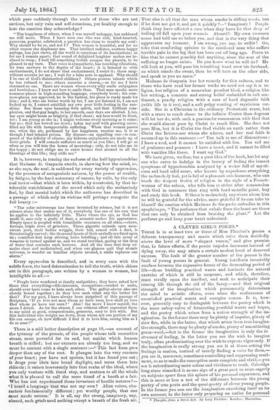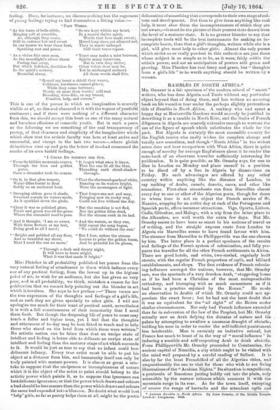A CLEVER GIRL'S POEMS.*
THERE is in at least two or three of Miss Fletcher's poems a delicate transparency and music which raise them decidedly above the level of mere " elegant verses," and give promise that, in future efforts, if the poetic impulse increases instead of dying away, she may attain a certain modest level of deserved success. The fault of the greater number of the poems is the fault of young poems in general. Young intellects invariably confuse between the expansive forces of the fermenting period of life—those budding practical wants and instincts the natural exercise of which is still in suspense, and which, therefore, react vividly upon the intellect, and seek to anticipate their coming life through the aid of the fancy,—and that original strength of the imagination which permanently determines the mind to artistic efforts, even when the restlessness of unsatisfied practical wants and energies ceases. It is, how- ever, generally easy to distinguish between the poetry which is the more safety-valve of fermenting youthful wants and hopes, and the poetry which arises from a native strength of the im- agination. In the former there may be plenty of impulse, plenty of slow fire, while in the latter, that which arises from true imagina- tive strength, there may be plenty of smoke, plenty of smouldering green-wood,—but in the former the imagination is only the in armed of feeling, in the latter you see the wish to imagine truly, often predominating over the wish to express vigorously. If the imagination is really strong you see it at times setting the feelings in motion, instead of merely finding a voice for them,— you see it, moreover, sometimes controlling and suppressing senti- ment, so as to make the conception more complete and vivid,—you see it subordinating mere colour and vividness to truth. Coleridge long since remarked it as one sign of a great poet to seize eagerly on subjects apart from the sphere of his personal experience, and this is more or less a test of the difference between the young poetry of true poets and the quasi-poetry of clever young people. In the former you can see the imagination exercising itself on its own account, in the latter only preparing an outlet for personal
• Thoughts from a girls Life. By Lucy Fletcher. London: Macmillan.
feeling. Here, for instance, we discern nothing but the eagerness of young feelings trying to find themselves a fitting voice:
".PAST WORDS.
"As the tones of bells abide, Ringing soft at eventide,
As, although they cease, Still in cadence low and sweet In our hearts we hoar them beat,
Speaking rest and peace.
As a vision fair once seen,
As the moonlight's silver sheen Fading, fast away, But which fadeless, deathless lie In the spirit's secrecy, Beautiful alway.
" So are kept within my heart, In a sacred shrine apart,
Words that love made sweet;, Heard long since, yet silenced not, Thoy in music unforgot Still their tones repeat.
"Years may make a mist between, Spirits many intervene, But in vain they strive; Other voices dear may be, Yet in unchanged memory All those words shall live.
"Round my heart a shield they weave, Coldness, harshness cannot grieve, While they come between ; Words, oh more than words! still rest Brooding, dove-like, on my breast, Comfort, help, and screen."
This is one of the poems in which an imagination is scarcely visible at all, so dim and obscured is it with the vapour of youthful sentiment ; and if there were nothing of a different character from this, we should accept this book as one of the many natural and harmless effusions of romantic youth. But in such a poem as the following we see something of the real transparency of poetry, of that clearness and simplicity of the imaginative whole which show that the artistic faculty was here at least active and successful, and except in the last two verses—,where girlish didacticism rises up and gets the better of it—had consumed the smoke of its own turbid feelings..
"I COULD Do mimes, TILE SUN.
Once a streamlet took its course. through.
" On it, in that glen remote, Water-lilies learnt to float Safely as an anchored boat.
" Drooping alders gave it shade, Sweetest sounds its waters made, As it sparkled down the glade.
" Clear it was as polished glass, Fresh and green was all the grass Where the stroamlet used to pass.
" And it thought, am so sweet, With these flowers at my feet, Doing good to all I meet ; " 'Bright and pebbled all my floor, And so beautiful my shore, That I need the sun no more.'
gorse, Threading each cloud-shadow "That the showered sparks of white, Dancing on its waters bright, Were the messengers of light.
" That forget-me-not and may, Fringing now its rocky way, Could not live without the day.
"But the sunshine is not fled, Nor the golden lilies dead, Nor the stream sunk in its bed.
" And the waters, as they run, Still repeat the song began, We could do without the sun.'
"But I fear, unless the stream Learns to prize the golden beam, And be grateful for its gleam, "Through a dark and dreary night, It will have to learn aright, What it was that made it bright."
Miss Fletcher in all probability published her poems from the very natural feeling of attachment to them which induces every one of any poetical feeling, from the lowest up to the highest point of art, to wish for an audience, but she has given so very poor, and in all probability, we think, mistaken a reason for her publication that we cannot help pointing out the blunder in art which it involves. She says iu her preface These verses are the true expression of the thoughts and feelings of a girl's life, and as such they are given specially to other girls. I will not apologize too much for their want of poetical merit, nevertheless it is with a full consciousness of their immaturity that I send them forth. But though the deepening life of years to come may teach a fuller and higher tone, yet I feel that the thoughts and utterances of to-day may be best fitted to reach and to help those who stand on the level from which these were written." No artistic notion can be falser than that an unripe state of intellect and feeling is better able to delineate an unripe state of intellect and feeling than the maturer stage of art which succeeds to it. It would be just as true to say that an infant could best delineate infancy. Every true artist must be able to put his object at a distance from him, and immaturity itself can only be truly painted with mature powers. It is almost as great a mis-. take to suppose that the unripeness or incompleteness of nature which it is the object of the artist to paint should belong to the artistic power which paints it, as to suppose that ignorance can best delineate ignorance; or that the power which draws and colours a bud should be less mature than the power which draws and colours the same bud expanded into a blossom. No doubt what would bast "help" girls, so far as poetry helps them at all, might be the poetic
delineation of something that corresponds to their own stage of cul- ture and development. But then to give them anything like real help, it must show them the incompletenesses of which they are not aware,—it must be the picture of their present state drawn from the level of a maturer state. It is no greater blunder to say that incomplete tools will be the best instruments for making an in- complete house, than that a girl's thoughts, written while she is a girl, will give most help to other girls. Almost the only poems which strike us as'really poetical in this collection are just those whose subject is so simple as to be, as it-were, fairly within the artist's power, and not an anticipation of powers still green and growing. Miss Fletcher has real fancy and grace, but " thoughts from a girl's life" to be worth anything should be written by a woman.































 Previous page
Previous page